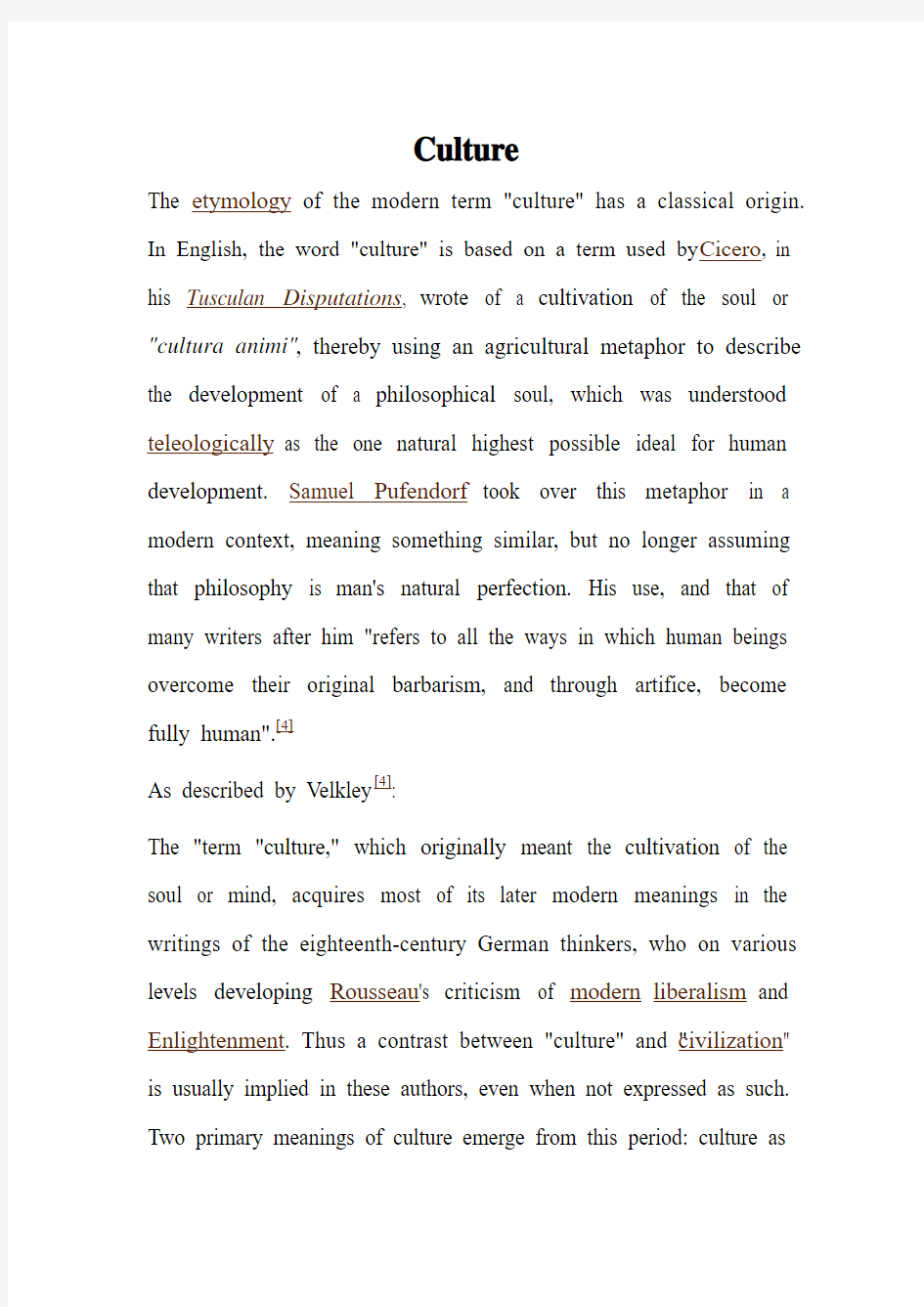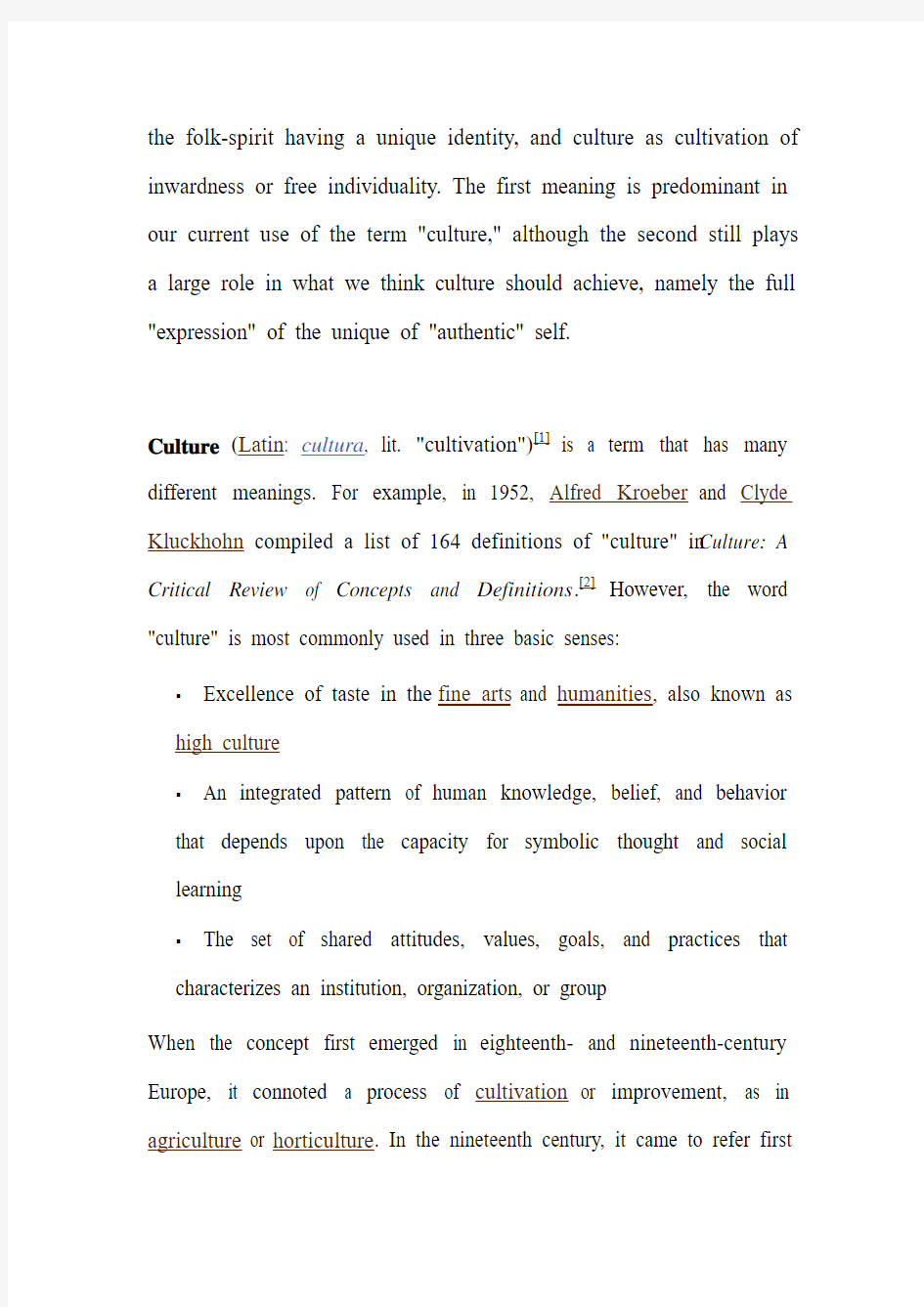Culture definition


Culture
The etymology of the modern term "culture" has a classical origin. In English, the word "culture" is based on a term used by Cicero, in his Tusculan Disputations, wrote of a cultivation of the soul or "cultura animi", thereby using an agricultural metaphor to describe the development of a philosophical soul, which was understood teleologically as the one natural highest possible ideal for human development. Samuel Pufendorf took over this metaphor in a modern context, meaning something similar, but no longer assuming that philosophy is man's natural perfection. His use, and that of many writers after him "refers to all the ways in which human beings overcome their original barbarism, and through artifice, become fully human".[4]
As described by Velkley[4]:
The "term "culture," which originally meant the cultivation of the soul or mind, acquires most of its later modern meanings in the writings of the eighteenth-century German thinkers, who on various levels developing Rousseau's criticism of modern liberalism and Enlightenment. Thus a contrast between "culture" and "civilization" is usually implied in these authors, even when not expressed as such. Two primary meanings of culture emerge from this period: culture as
the folk-spirit having a unique identity, and culture as cultivation of inwardness or free individuality. The first meaning is predominant in our current use of the term "culture," although the second still plays a large role in what we think culture should achieve, namely the full "expression" of the unique of "authentic" self.
Culture(Latin: cultura, lit. "cultivation")[1]is a term that has many different meanings. For example, in 1952, Alfred Kroeber and Clyde Kluckhohn compiled a list of 164 definitions of "culture" in Culture: A Critical Review of Concepts and Definitions.[2]However, the word "culture" is most commonly used in three basic senses:
?Excellence of taste in the fine arts and humanities, also known as high culture
?An integrated pattern of human knowledge, belief, and behavior that depends upon the capacity for symbolic thought and social learning
?The set of shared attitudes, values, goals, and practices that characterizes an institution, organization, or group
When the concept first emerged in eighteenth- and nineteenth-century Europe, it connoted a process of cultivation or improvement, as in agriculture or horticulture. In the nineteenth century, it came to refer first
to the betterment or refinement of the individual, especially through education, and then to the fulfillment of national aspirations or ideals. In the mid-nineteenth century, some scientists used the term "culture" to refer to a universal human capacity. For the German nonpositivist sociologist Georg Simmel, culture referred to "the cultivation of individuals through the agency of external forms which have been objectified in the course of history".[3]
In the twentieth century, "culture" emerged as a concept central to anthropology, encompassing all human phenomena that are not purely results of human genetics. Specifically, the term "culture" in American anthropology had two meanings: (1) the evolved human capacity to classify and represent experiences with symbols, and to act imaginatively and creatively; and (2) the distinct ways that people living in different parts of the world classified and represented their experiences, and acted creatively. Following World War II, the term became important, albeit with different meanings, in other disciplines such as cultural studies, organizational psychology and management studies.
Definition of Culture
Culture is a definition highly misunderstood and misused, thus the need for an explanation:
Culture refers to the following Ways of Life, including but not limited to:
?Language: the oldest human institution and the most
sophisticated medium of expression.
?Arts & Sciences: the most advanced and refined forms of human expression.
?Thought: the ways in which people perceive, interpret, and understand the world around them.
?Spirituality: the value system transmitted through
generations for the inner well-being of human beings, expressed through language and actions.
?Social activity: the shared pursuits within a cultural
community, demonstrated in a variety of festivities and
life-celebrating events.
?Interaction: the social aspects of human contact, including the give-and-take of socialization, negotiation, protocol, and conventions.
All of the above collectively define the meaning of Culture.
